 TEHRAN, Aug 3: Dr Mahmood Ahmadinejad became Iran’s new president on Wednesday. The 48-year-old former mayor of Tehran, who holds a PhD in engineering and transport from the Tehran University and staunchly supports Iran’s 1979 Islamic Revolution, won a landslide election victory in June and was appointed president by Supreme Leader Ayatollah Ali Khamenei.
TEHRAN, Aug 3: Dr Mahmood Ahmadinejad became Iran’s new president on Wednesday. The 48-year-old former mayor of Tehran, who holds a PhD in engineering and transport from the Tehran University and staunchly supports Iran’s 1979 Islamic Revolution, won a landslide election victory in June and was appointed president by Supreme Leader Ayatollah Ali Khamenei.
“I therefore ... approve the vote of the nation and appoint Dr Mahmood Ahmadinejad as the President of the Islamic Republic of Iran,” said a text by Khamenei read out at an official ceremony by outgoing reformist President Mohammad Khatami. Ahmadinejad was warmly embraced by the Leader before reaffirming his pledge to fight for the common man.
“As a servant of the republic and a drop in the endless ocean of the Iranian nation ... I commit myself to respond to the trust and hopes of such a nation by serving them honestly,” he told Iran’s leading figures assembled at his investiture. Ayatollah Khamenei leant over to congratulate the new president on his speech: “Bravo, really good.”
The president in Iran appoints ministers who manage the day-to-day business of government. But the government’s power is checked by a number of bodies answerable to Khamenei, the most powerful figure in Iran who is appointed for life. Ahmadinejad takes an oath of office at a further ceremony on Saturday at which he is due to announce his cabinet.
The former Tehran mayor takes over the government as Iran edges closer to possible UN Security Council sanctions over its nuclear programme. Ahmadinejad made no specific mention of the nuclear issue, but said: “Elements of global threat including weapons of mass destruction, chemical and biological, which are now in the hands of the hegemony must be eradicated.”
In order to break this impasse, EU diplomats have been trying to get Iran to surrender its nuclear fuel work in return for economic incentives. But Iran says such a compromise is unacceptable and a spokesman said it hopes to resume nuclear fuel work on Wednesday, a move that threatens to end EU mediation.
In Iran’s political system, analysts are split on whether top policy makers are somehow setting the stage for Ahmadinejad to save the day with a new deal or whether he is subservient to their greater national goals.
The victory of the former Revolutionary Guard sent ripples of fear through the investment community, compounded when he said he would clean out corruption in the oil industry and give no preferential treatment to foreign firms.
But analysts say investors should take a “wait and see” approach, arguing that Ahmadinejad took a pragmatic line as Mayor of Tehran and could well do so again as president.—Reuters















































Dear visitor, the comments section is undergoing an overhaul and will return soon.